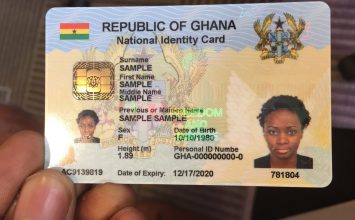![Importance of issuance of national ID numbers to newborns at birth [Article]](https://ghheadlines.com/images/default.png)
Identity is the cornerstone upon which societies operate, a fundamental thread woven into the fabric of our daily lives. In an era marked by rapid digitalization and evolving global challenges, the need for a robust and comprehensive system of identification has never been more pressing. At the heart of this lies the proposition: the issuance of national identification numbers at birth.
Imagine a world where every individual, from the moment they enter this world, is endowed with a tangible symbol of their identity, a national identification number. This tag, more than a mere piece of plastic or paper, is a lifelong assurance of one’s existence within the societal framework.
It is a key that unlocks access to essential services, guarantees security, and forms the bedrock of efficient governance.
Ghana, a middle-income nation in West Africa, is home to over 30 million people. The country is frequently cited as an excellent illustration of a stable democracy in Africa, with peaceful inter-party transitions and multi-party elections. Functioning ID cards such as the National Health Insurance Scheme (NHIS) card and the voter’s ID have historically dominated Ghana’s ID space.
The country lacks a history of implementing a fundamental national ID and has struggled to create an efficient birth registration system (Allan, 2015). A “card glut” has been identified by Falconer et al. (2020) as the result of the proliferation of various state-issued ID cards throughout time. To stop the issuance of multiple state-issued IDs, the Ghanaian government has committed resources in recent years to establish a national ID system that will create “one ID for all.” “Integrated multi-sectoral and multipurpose National Identity System” is the goal set forward by the government and National Identification Authority (NIA, n.d.). Since the national ID is still new in terms of adoption and use, a mass registration effort was carried out in 2020 and that was followed up with mop-up registrations across the country (Citi Newsroom, 2020; Kasapa FM, 2021).
On March 8, 2023, the Vice President Dr Mahamudu Bawumia announced that Personal Identification Numbers (PIN) would be issued to newborn babies at birth. He intimated that it would be a special identification number for every child throughout his/her education journey and not wait till age 15 before registration (Arthur-Mensah, 2023). According to the National Identification Authority (NIA), while newborn babies will be given ID numbers at birth, cards bearing their biometric data will be issued to them when they are older, after their biometric features are fully developed. Should this be done, Ghana will be among one of the very few countries in the world such as Norway, Finland and Sweden, that do not only have national IDs but also issue ID numbers to newborns at birth.
In this article, I will delve into the realm of national identification cards and advocate for their issuanceat birth asapivotalsocietal milestone. From enhancing individualsecurity to streamlining bureaucratic processes and fostering inclusive economic growth, these cards stand as a beacon of
progress and unity. The article contends that embracing this practice is not just a matter of convenience but an imperative step towards a more cohesive and secure future for all.
DEFINITION AND PURPOSE OF NATIONAL IDENTIFICATION CARDS
A national identification (ID) card is an official document issued by a government to its citizens and/or residents. It typically contains personal information about the individual, such as their full name, date of birth, a unique identification number, a photograph, and sometimes other biometric data like fingerprints or iris scans, among other important features of the individual. The card serves as a means of confirming a person’s identity and citizenship (Oduro-Marfo et al, 2021).
The goal of Ghana’s National Identification Card is to build a consolidated foundational ID system that facilitates business transactions, promotes economic inclusion, and by which Ghanaians easily access financial services, government programs and economic opportunities like accessing student loans with no guarantor, opening a mobile money/bank account and receiving welfare assistance. These are vital tools for making progress towards socio-economic development and for participating in the digital economy.
It must be recalled that the concept of the Ghana card dates back to 2006, but it has only lately (from 2017) been successful in enrolling citizens and issuing them with IDs. Because of this, its application is still relatively new, and over the coming years, its triumphs and practical obstacles should become more apparent (Oduro-Marfo et al, 2021). With the context established, I now turn to the economic impacts of issuing National identification numbers, particularly to newborns at birth.
ECONOMIC BENEFITS OF THE NATIONAL IDENTIFICATION SYSTEM
First, the national ID system will streamline government processes, improving access to government services. A national ID offers a consolidated database for easy and safe access to citizen data, which helps to improve access to government services. This makes it unnecessary to submit the same information more than once and streamlines the application procedures for healthcare, taxes, and social benefits, among others. For instance, the Social Security and National Insurance Trust (SSNIT) and the NHIS are two registries that are connected to the Ghana Card PIN (CBN, 2021; ISD, 2020). Additionally, the government has enabled the Ghana Card number to serve as a Taxpayer Identification Number (TIN) for citizens. This integration of Ghana Card PIN and TIN alone has broadened the tax base from 4% to over 80%. Meaning, Government may not need in future to increase the tax burden of the few (4%) who in the past were paying taxes.
Secondly, it enables the Government to invest the monies that could have been used in printing other cards such as the SSNIT and NHIS cards in other key areas of the economy. In a 2022 article, SSNIT was quoted to have merged some 1.9 million SSNIT subscribers to the national ID
database, saving the Scheme about GH?60million that would have otherwise gone into the printing of new cards. Seeing numerous adult Africans with ID cards jam-packed into their wallets and weighing down their pockets is not unusual. This is a result of various organizations, public and private issuing identification cards to their stakeholders and clients; this is also a problem that a national ID could easily solve.
Thirdly, the National ID plays a crucial role in ensuring financial inclusion by providing individuals with a recognized and standardized form of identity. Thus, a national ID will ensure financial inclusion because it would lead to access to banking services. Financial institutions require identification to open bank accounts, apply for loans, or access various financial services. Without proper identification, many individuals, especially in underprivileged communities, would be excluded from these services.
Additionally, with the introduction of a formal national ID, individuals could start building a credit history quite early. This history is crucial for accurate assessment of risks, potentially lowering costs, and interest rates for financially underserved populations. Access to affordable credit allows small businesses and entrepreneurs to thrive, fostering economic growth. Similarly, national IDs at birth could ensure that government youth welfare programs and subsidies reach the intended beneficiaries directly. This reduces leakages and ensures that those in need receive the financial assistance required.
Finally, a national ID will ensure overall economic growth and development. This stems from the fact that financial inclusion through national IDs could contribute to poverty reduction by providing opportunities for economic participation and empowerment. Again, a more inclusive financial system contributes to economic stability and resilience by broadening the base of consumers and reducing inequality. Thus, a national identification system is instrumental in breaking down barriers to financial inclusion. They empower individuals by granting them access to formal financial services, fostering economic growth, reducing poverty, and promoting a more equitable society. With the benefits of the National ID System discussed, I turn to why it is necessary to issue ID numbers at birth.
BENEFITS OF ISSUING NATIONAL ID NUMBERS AT BIRTH
Issuing national ID numbers to newborns at birth comes with many benefits.
The acceptance and use of an ID system by the business community are hinged on the very credibility of such a system. Thus, system credibility is perhaps the single most important reason why I advocate the issuance of ID numbers at birth. Issuing ID numbers at birth rather than waiting till later years helps to curb opportunities for identity theft and fraud. The existing framework of birth registration system obviously leaves room for the operations of ‘goro boys’ and other middlemen who use illicit means to alter or steal identities for various reasons, sometimes for criminal purposes. In the long term, issuing ID numbers to all persons born in the country will
mean that by adulthood, such persons can be traced right to their birth. It is a process that stands to strengthen the confidence in the Ghana Card, encouraging people and institutions to do business with it.
Further, issuing ID numbers at birth has the potential to dramatically reduce crime in the country. Economic activity thrives in a convivial environment and any policy that stands to reduce crime is good for the business community. Often, criminals use identity theft and manipulation to secure communications media in planning their activities. It is not uncommon for cyber criminals to register sim cards and other communications devices with fake identities. The activities of these criminals present a challenge to the current digitalization drive of the government and ultimately stifles businesses operating in that space. Opportunities to manipulate identity systems, register sim cards and use various communications channels for criminal purposes stand to be significantly reduced with the introduction of national identification at birth.
Thus, for the sake of system credibility, security and need to realize the full benefits of the National Identification System, I strongly support the issuance of ID numbers to babies at birth.
LIMITATIONS AND CONCERNS OF ISSUING NATIONAL ID NUMBERS TO NEWBORNS AT BIRTH
Critics have identified some limitations of the policy as follows:
There is concern about privacy infringement. Though issuing national ID numbers to newborns at birth could lower the number of identity theft cases, some people are concerned that when this is done, personal information could be misused by the government.
Finally, there is the worry that due to bureaucratic inefficiencies, there may be long queues for parents to obtain national ID numbers for their newborns. As such, there may be newborns put at a disadvantage since they will not get their national ID numbers at birth.
However, it is important to note that these concerns could be addressed by laws and regulations on the Ghana national identification system. Furthermore, these regulations should be reinforced by the Data Protection Authority. On the long queues, it is important to note that the Ghanaian government and the NIA have chosen inclusive options, such as initiating a mass registration drive from community to community, providing the Ghana card at no cost and setting up a National Identification Authority office in every district.
CONCLUSION
These strengths of the policy notwithstanding, some critics have identified some limitations of it while others have expressed concerns or skepticism about same. However, the benefits of issuing ID numbers to newborns at birth far outweigh the challenges. Moreover, these concerns could be addressed through regulationsand laws, among others. Assuch, thepursuitof theagendaof issuing
National ID numbers at birth, and the full implementation of the policy is recommended while steps are taken to deal with any potential challenges and threats.
The Author is Kwasi Nyame-Baafi, PhD
Development Economist
The post Importance of issuance of national ID numbers to newborns at birth [Article] appeared first on Citinewsroom - Comprehensive News in Ghana.
Read Full Story



















Facebook
Twitter
Pinterest
Instagram
Google+
YouTube
LinkedIn
RSS